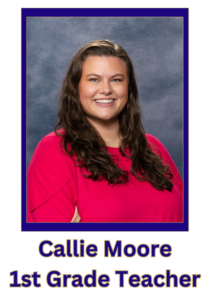
At Riverhill School, the first grade is focused on the development of the whole child. We implement a positive learning environment where the child has multiple opportunities to learn. First grade is a special time in a child’s life. This is a time when a child gains self-confidence in his/her learning as well as develops a love for learning. In first grade at Riverhill, the goal is to continually challenge each child to his/her potential. This is done through constant teacher-student interaction in learning as well as through a research-based curriculum. By using various forms of teaching, first grade at Riverhill School provides the appropriate challenge a child needs at this age. In first grade, numerous cooperative learning groups give students a chance to interact with their peers and to solve problems collaboratively. The Reading program ensures that every child is receiving the individual attention he/she needs through small groups and hands-on learning. Reading aloud to children makes the world of difference in developing a love of reading. In first grade, students are continually exposed to new books and materials. Every child is able to accelerate through the use of manipulatives, technology, literature, and writing. The intimate classroom environment and dedicated teachers allow children to be successful in all areas of learning. The moral and ethical values provided enable children to succeed now and in the future. First-grade students learn the meaning of respect of self, others, school, and the community by the example set as well as by the incorporation of positive peer interaction across the curriculum daily.
Curriculum Summary
- Narrator
- Fiction/Nonfiction
- Beginning/ending sounds
- Short/long vowels
- Context clues
- Main idea
- Predicting outcomes
- Comprehension
- Vocabulary
- Drawing conclusions
- Sequence
- Word order
- Story telling
- Poetry
- Stated details
- Digraphs
- Commas
- Possessives
- Singular
- Plural
- Following written and oral directions
- Story plot
- Initial clusters/Final clusters
- Realism and fantasy
- Quotation marks
- Endings: -es, -ed, -s, -ing, -ly
- Base words/Compound words
- Dolch words/sight words
- Characterization
- Cause and effect
- Rhyme
- Title page/Table of contents
- Author/Illustrator
- Sharing information
- Summarize
- Decoding Words
- Fluency
- Consonants
- Short vowels
- Long vowels
- Blends
- Beginning sounds
- Ending sounds
- Special sight words
- ABC’s manscript
- Journal writing
- Sentence writing
- Informational material
- Famous People
- Harriet Tubman
- Annie Oakley
- Lewis & Clark
- Davy Crockett
- Pilgrims/Indians
- Martin Luther King, Jr.
- George Washington
- Abraham Lincoln
- Paul Bunyan
- John Henry
- Betsy Ross
- Helen Keller
- Neil Armstrong
- Governor
- President
- Leader & their roles
- Rights & Responsibilities of Citizens
- Daily schedules, timelines
- Needs vs. Wants
- Maps
- State
- Continents
- Oceans
- Symbols
- Our Environment
- Past, Present and Future
- Land masses, bodies of water, etc.
- Difference between natural resources and human made products
- Role of Money
- Holidays
- Different Cultures
- Celebrations
- Friendship
- Flag
- Pledge
- Colors
- Stars/stripes
- Study skills
- Subjects
- Nouns
- Verbs
- Adverbs
- Adjectives
- Pronouns
- Syllables & sounds
- Retell
- Text features
- Headings, glossary, icons
- Conjunctions
- Writing statements
- Writing a question
- Capitalizing the pronoun I
- Capitalizing names of people
- Capitalizing days of the week, months, towns, and states
- Writing sentences
- Subject/verb parts
- Paragraphs
- Writing Informative & explanatory texts
- Counting to 1,000
- Number writing to 1,000
- Even and odd numbers
- Writing and reading Roman numerals 1-10
- Recognizing cardinal and ordinal number words 1-20
- Place value
- Addition and subtraction families 1-18
- Addition and subtraction two and three digit numbers
- Writing addition sentences
- Writing subtraction sentences
- Problem solving
- Money
- Adding and subtracting money
- Geometric shapes: square, circle, rectangle, triangle
- Symmetry
- Graphs
- Logical thinking
- Calendar (days, months, seasons)
- Measurement (inches, centimeters)
- Time (to the hour, half hour, quarter past, quarter till, and five minute intervals)
- Fractions: 1/2, 1/3, 1/4
- Temperature
- Perimeter
- Multiplication (groups of two, three, five, and ten)
- Equations
- Sound
- Matter
- Solids, Liquids and Gases
- Living & Nonliving things
- Ways things move
- Season
- Parts of plants
- What plants need to grow
- Simple plants
- Sunglight
- Soil
- Water
- What animals need
- Animals that no longer exist
- Classification of animals
- Homes/Habitats
- Mammals
- Earth’s surface
- Ways to conserve Earth’s resources
- Natural resources
- Uses of recycled material
- Compare day & night
- Weather: rain, wind, snow, sleet, hail, thunderstorms, tornadoes, clouds, rainbows, thermometer
- Magnets
- Oceans
- Fresh/Salt Water
- Vertebrates: Whales and Dolphins
- Shells
- Sequence
- Fossils
- Basic Properties of object
- Effect of forces on objects
- Classifying plants and animals according to physical traits
- Human Body

